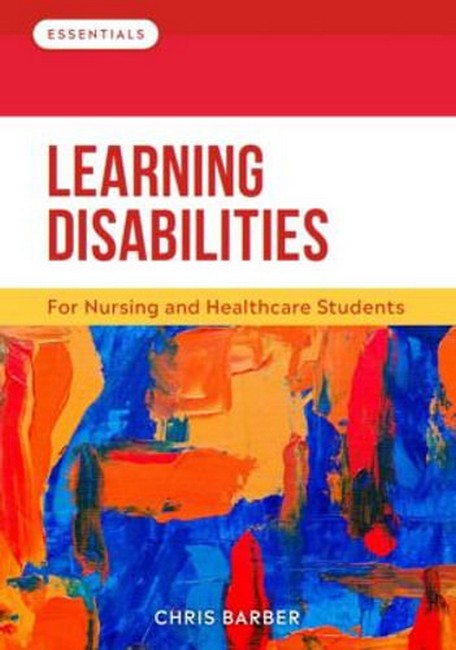Chris Barber is a registered nurse (learning disabilities), qualifying as such in December 1989, and he holds an MEd from the University of Birmingham in special educational needs (autism). He has worked as a nurse, as a visiting lecturer in learning disability nursing at Birmingham City University, and for the eleven years up to 2021 as a full-time care-giver for his late wife. Chris is a parent of a young man who is on the autism spectrum, and he himself was diagnosed at the end of 2008 as being 'high-functioning autistic'. Chris sits on the editorial boards of the British Journal of Nursing, the British Journal of Mental Health Nursing, and the British Journal of Health Care Assistants and has written a number of articles and papers on a wide variety of subjects including learning disabilities, care givers, spirituality and autism. He is the author of Autism and Asperger's Conditions, published by Quay Books in 2011.
Request Academic Copy
Please copy the ISBN for submitting review copy form
Description
Foreword; Preface; Acknowledgements; About the author Chapter 1 Introduction 1.1 Who is this book for? 1.2 A brief overview of the book Chapter 2 What is learning disability? 2.1 Introduction 2.2 Definition 2.3 Basic history 2.4 What it means to have a learning disability 2.5 Conclusion Chapter 3 Nursing support for those with profound and multiple learning disabilities 3.1 Introduction 3.2 What is PMLD? 3.3 Twelve activities of daily living 3.4 Conclusion Chapter 4 Learning disability legislation and reports 4.1 Introduction 4.2 Differences between Bills, Acts, White Papers, Green Papers and reports 4.3 Key documents relating to learning disabilities 4.4 Suggestions for further research 4.5 Conclusion Chapter 5 Medical care and support for those with a learning disability 5.1 Introduction 5.2 Healthcare needs of those with a learning disability 5.3 Roles of the nurse 5.4 Professional development opportunities 5.5 Conclusion Chapter 6 Learning disability and consent to treatment 6.1 Introduction 6.2 What is consent? 6.3 Forms of consent 6.4 Mental Capacity Act 2005 6.5 Assessing mental capacity 6.6 The role of the nurse 6.7 Conclusion Chapter 7 Learning disability and mental health 7.1 Introduction 7.2 What is mental health? 7.3 Forms of mental ill-health 7.4 Prevalence 7.5 The role of the nurse 7.6 Conclusion Chapter 8 Learning disability and forensic care 8.1 Introduction 8.2 What are forensic services? 8.3 Prevalence 8.4 A journey through forensic services 8.5 The role of the nurse 8.6 Conclusion Chapter 9 Sexuality and people with a learning disability 9.1 Introduction 9.2 What is sexuality? 9.3 Issues regarding sexuality and those with a learning disability 9.4 The law 9.5 Issues around consent 9.6 The role of the nurse 9.7 Conclusion Chapter 10 Ageing and those with a learning disability 10.1 Introduction 10.2 What is old age? 10.3 Normal ageing 10.4 Common medical conditions 10.5 Dementia 10.6 The role of the nurse 10.7 Conclusion Chapter 11 Dying, death and bereavement and people with a learning disability 11.1 Introduction 11.2 Dying 11.3 Death 11.4 Do not attempt cardiopulmonary resuscitation (DNACPR) 11.5 Bereavement 11.6 The role of the nurse 11.7 Conclusion Chapter 12 Care and support for those who are informal caregivers 12.1 Introduction 12.2 What is 'informal caregiving'? 12.3 Experiences of those who are caregivers 12.4 Caregiver legislation and strategy 12.5 The roles of the nurse 12.6 Conclusion Chapter 13 Disability and carer discrimination 13.1 Introduction 13.2 What is discrimination? 13.3 Anti-discrimination legislation 13.4 Experiences of those who have a learning disability 13.5 The roles of the nurse 13.6 Conclusion Chapter 14 Learning disability and spirituality 14.1 Introduction 14.2 What is spirituality? 14.3 Barriers to experiencing and practising spirituality 14.4 Spiritual resources 14.5 The role of the nurse 14.6 Conclusion Chapter 15 The future and learning disability 15.1 Introduction 15.2 Past 15.3 Present 15.4 Future 15.5 Conclusion Glossary; Resources; Index

